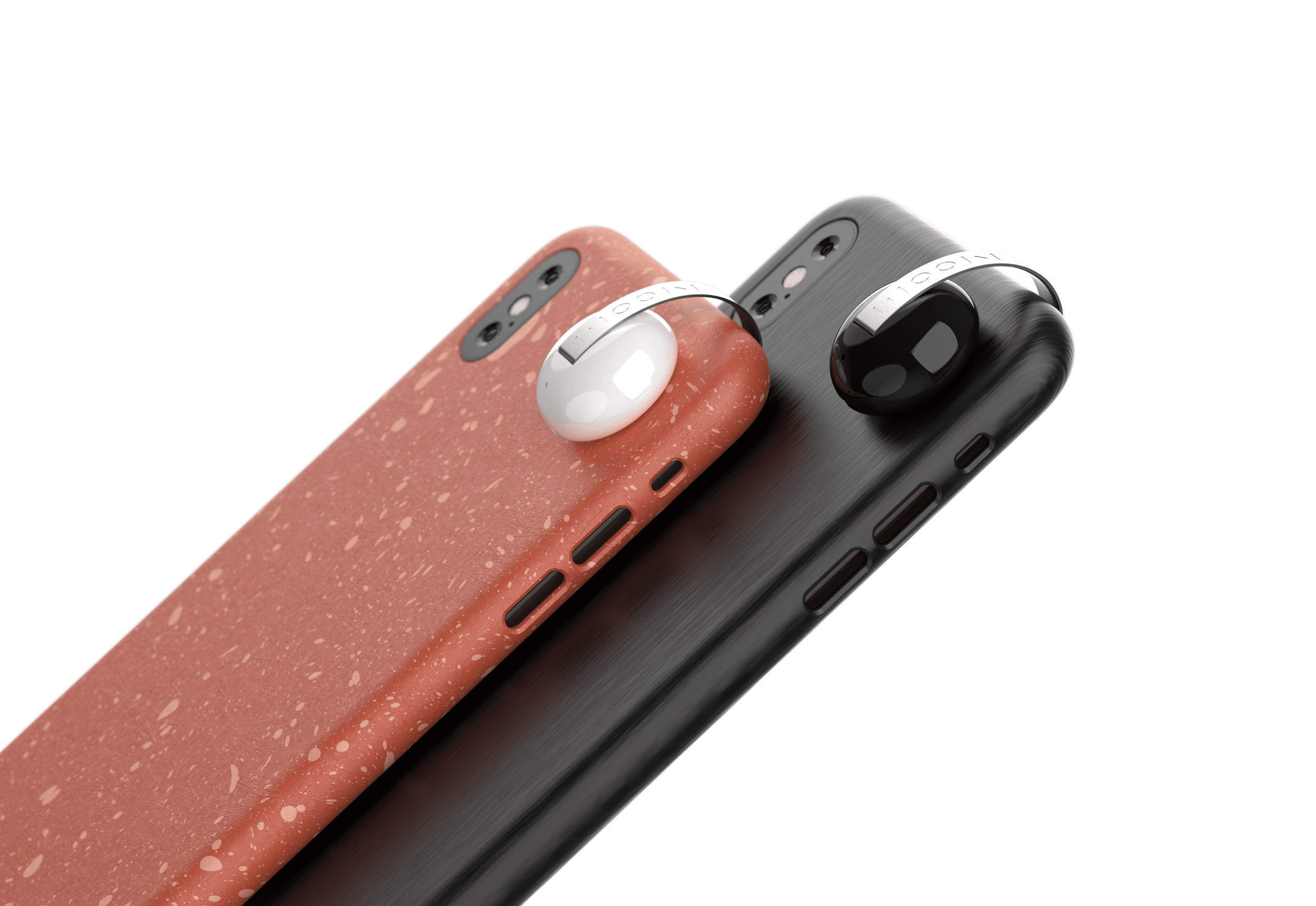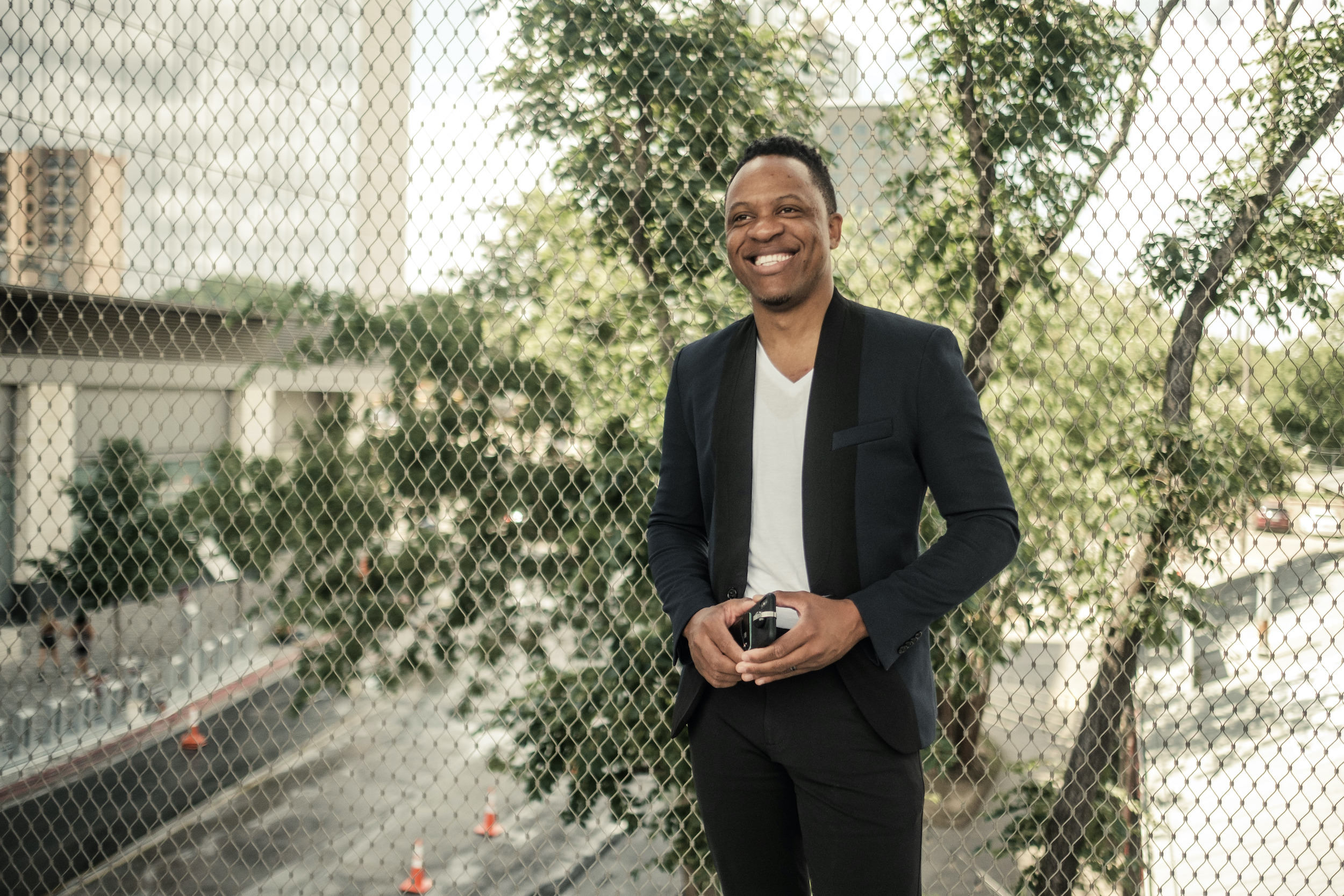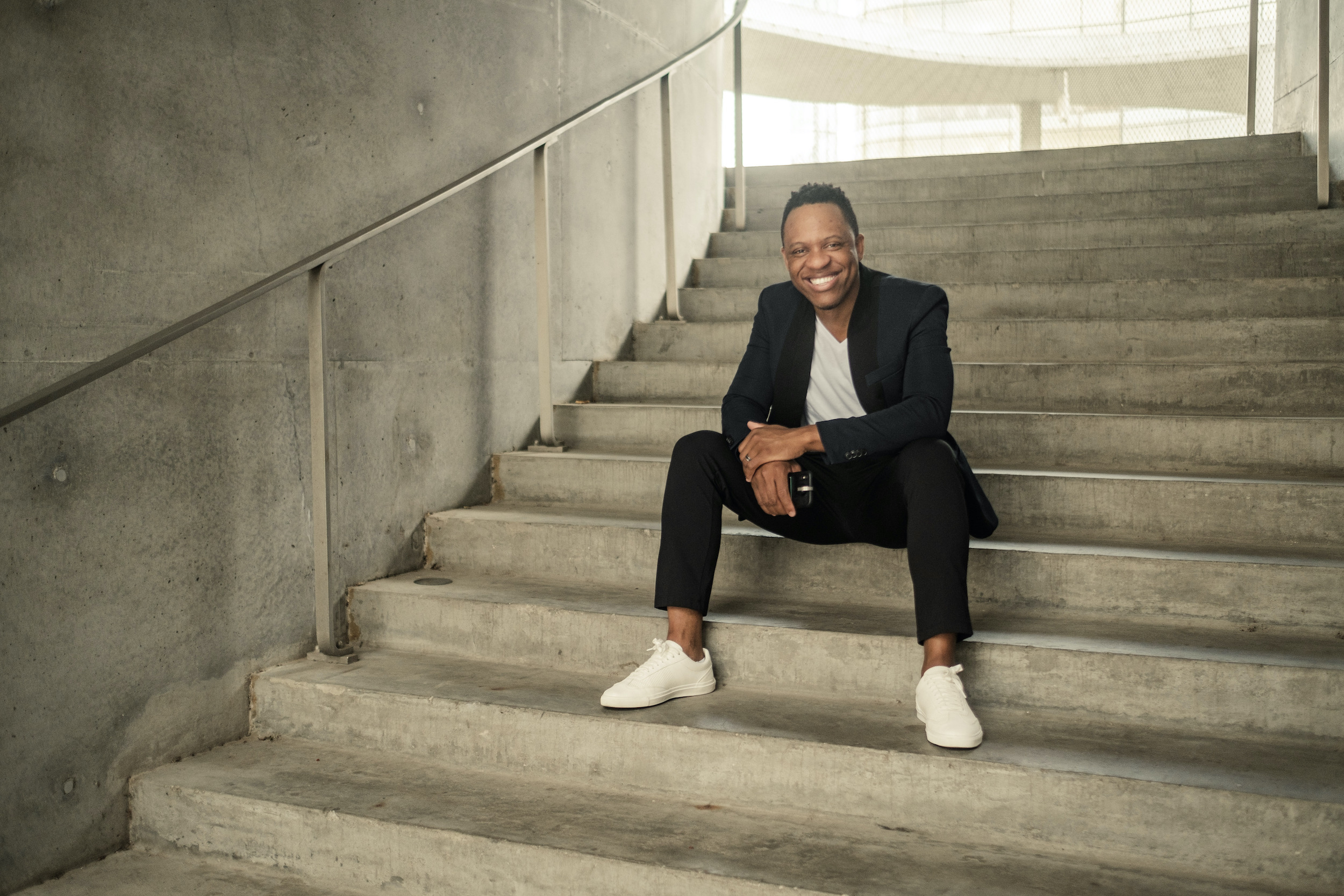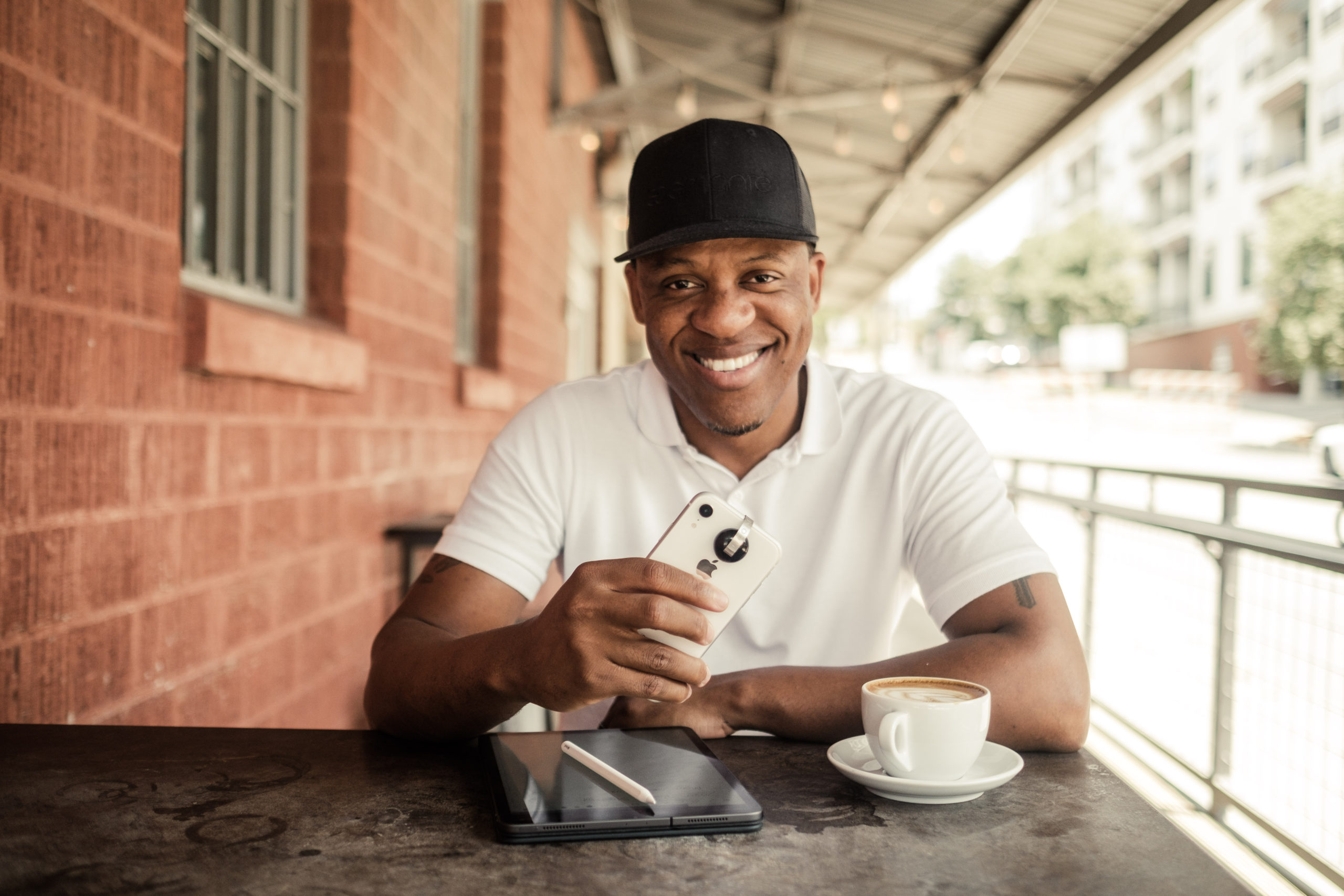We sat down with MOON UltraLight’s Founder and CEO, Ed Madongorere. Born in Africa and raised in America as an infant, Ed got the chance to go back to school in Africa for 4 years as a teen. This experience helped Ed pave his own way as an entrepreneur by rising to the top on his own version of the ‘beaten path.’
Recently named one of Time Magazine’s “25 Best Products of CES 2020,” the MOON is a sleek, portable, and adjustable lighting device for phones, tablets, and laptops that has made capturing moments, ZOOM meetings, and creating digital content more advanced and industry-approved. Ed’s brand has recently partnered with REVOLT TV to provide lighting for their at-home talk show series “You Good?” hosted by Terrence J and recent guest, Idris Elba.
CC: How did you become an entrepreneur?
EM: My goal was actually to design cars. I applied to school in San Francisco, got accepted, but unfortunately, I couldn’t afford to go. So my path in entrepreneurship started with working in the [real] world and just doing. My career path took a turn from picking up phones in customer service roles to working my way [up] in a marketing team and building my career from there.
I was into music. Because I made music, I learned how to edit software for music. Then I had to create an album cover, so I taught myself how to use photoshop and illustrator and all the other design schools. I wanted to make a music video, so I had to learn how to film. Everything I wanted to do in some sort of fashion led me to learning new skills. I just didn’t know that I could use these same skills to grow early in my career and build a company for myself.
I was [starting] a film production company that led me to the love of content creation. You know — film, video production, all the fun stuff. When MOON came to the forefront, it was sort of a happy accident where I happened to have all the skills needed that I had acquired over the years. I had the know-how to say, ‘Hey, I have these skills, and if I can [find] a team of people who have the skills I lack — together we can create something.”
CC: How did you come up with MOON UltraLight?
EM: So our son, Jaden has autism, and my wife and I had an epiphany. When the time comes, when our son asks that question of how did we get here in life wherever that is, I wanted to be able to share with him the history of how this was all built. That we’re going to forget a lot of things, and the only way to truly remember it all is to document it. The only way I know how to document is to capture content, so we became obsessive about taking photos and videos of everything for him. You name it. Going to dinner, before eating, the food we’re about to eat. Everything.
In that process we discovered that we loved creating content, but the photos were terrible at night. Videos and photos were just grainy and bad. So this one night, I was with my wife at a restaurant sharing an intimate moment and we decided to capture it with a photo. She was struggling to get the photo done, and I was frustrated by her frustration. She challenged me in the moment, and said, ‘think outside the box, come up with a solution.’ So I took both our phones, placed them back to back, peaked out the light on one of the phones a little bit, turned on the flashlight, held them as one phone, and took a selfie of us. My wife was impressed, and I was impressed that she was impressed.
And then I saw this couple. This lady kept looking right at me while we were doing this. And I didn’t know if it was because we were causing a scene or something, but halfway through dinner I looked over. And they’re doing the exact same thing. In the moment, I was like wait a minute — we’re not the only ones that have the same issue. Chances are there are a lot of people who have this issue.
Because of my history and what I had done in the past with film, with production and design, with working in the corporate world; all of these skills culminated into that one single moment. And I was like, ‘I think I am the one to solve this problem.’ Because I was prepared to solve the problem. I started a prototype right away, and that’s where my journey began.

EM: When we found out Jaden was autistic, we were like, ‘okay so we can do one of two things.’ We can either follow the same path that is paved by doctors and scientists — which I believe in. I think it’s all valid, however, I remember the doctor said some things that I didn’t agree with — follow certain routines for your child, don’t put him in loud places because he won’t like loud noise. There were a lot of don’ts. And I was raised by a woman who wouldn’t allow us to say can’t or don’t. So I thought, ‘let’s do the complete opposite of that.’ If we do the opposite, chances are it might work for him.
The day he got his diagnosis, we took him to the busiest mall in our neighborhood. We were terrified that he’s gonna be terrified. But his discomfort turned into curiosity. There’s a photo we took of him looking up at a sign of a store with the eyes of, what is that? We took him different directions every time we went home, we sat him in a different seat, we ate dinner at different times. We just did everything off the beaten path. And that ended up being the best thing we could’ve done for him.
Every kid is different. But for us, every moment can’t be the same, you can’t plan for every moment. Because the world just is not like that. We didn’t want to raise him in a world where he would think everything is A, B, C, D. Sometimes things get messy. So we wanted to be a little messy for him.
We’re all creative in the household, so he’s surrounded by that. He’s very into numbers right now. He’s teaching himself how to count to trillions and create number patterns. He’s brilliant. We fostered a household where we don’t believe there are limitations. We felt that this environment will help him in his future.
CC: What is your opinion on how entrepreneurship can lead to a more equalized playing field and empower the Black community?
EM: Being a Black man growing up in America, I had the experience of being able to learn from so many different cultures. I had the opportunity to live and learn in another country. I went to school in Zimbabwe in Africa. You get to that part of the world, you get off the plane, and the pilot’s Black and the person at the gate is Black and the hotel manager is Black and the mayor and the president. You see all of these really successful people and even people who are middle class living their life — but there’s a lot of them that look like you. That was the first experience of seeing, ‘wow, there is a whole country of people who look like me who are doing this and it’s the norm.’
But then I go back to New Hampshire, and I end up going to a predominately white school. There are two or three Black kids in the school. There is no representation of me in this environment. In fact, I am the one who’s educating people for the first time about what Black culture is all about, seeing I am the first Black person they’ve ever met. I’ve experienced both of those worlds, I got to work in the corporate world, I’ve made music with singers and rappers, I’ve worked with actors, I’ve seen a lot of different styles of individuals, personalities, and cultures that have helped me shape my perspective.

For example, if you’re used to seeing a Black person who’s wearing a NY Yankees fitted hat really low and maybe their pants are sagging a little bit, and they’re walking down the street. The only representation you see on television of a person who looks like that is somebody who is either a ball player or a thug or a criminal. You’re going to go through life thinking if you see someone like that in real life, that’s who they are. Right? Because that’s what you were inherently taught.
When you look at people like Jay Z — he’s not dressing like that on purpose. He’s been dressing like that all his life. Now he’s in a boardroom looking like that. He’s changing the narrative, saying ‘hey, those people looking like that may actually be the smartest people in the room.’ I think representation is so important because we need people who look that way, that dress a certain way in these roles so we have a truly universal and diverse world.
I heard something on Instagram the other day about ownership — if most of the NBA players decided to start their own league, what would that look like? And it’s kind of true, we have a league that is predominantly Black, but very little representation on the top. Zero ownership.
I think at some point, the playing field is going to shift where these players realize that their power really is in who they are. No one is watching the game of basketball to look up at the sky box to see who’s the owner. They’re looking at the field to see who’s playing. They’re interested in the player’s lives. They’re following them on Instagram and Twitter. And to just look at those people and say, ‘they already won’ is kind of half-glass-full if you will.
There are not that many Black founders, women of color founders. But the ones that are already there, they need to get the most support. Investors see pitch-decks come their way and they’ll say, ‘we should invest in this founder — they went to Stanford and worked at Google and know so-and-so,’ but we don’t have that. I don’t know anyone who, at the time I started MOON, worked at Google or had advisors that would make investors care. It’s going to take the community saying, ‘Hey, these Black companies are out there. Let’s support them.’
We need to make sure these founders start to win because once they start to win, then you get the pattern recognition from our own communities of people saying, ‘I don’t just have to be an NBA player or a football player or musician? I can be an entrepreneur?’ Right now there are no stats. No one’s growing up in any inner city community saying, ‘I want to be an entrepreneur.’
I think we need more representation of Black founders starting something — even if they’re failing at it but at least getting the support they need. You’re more likely to succeed after a couple of failures. Look at Instagram. They weren’t funded to start Instagram, they were funded to start something completely different. They pivoted. But the fact that they were funded meant they had the opportunity to pivot. Look at Black companies — they don’t get funded at all. So let’s say they make a mistake and want to pivot, they don’t have that opportunity.
CC: What is the most challenging moment you’ve had as an entrepreneur? And how did your wife contribute? How did you and your wife work together through this challenge?
EM: The biggest struggle for me in the beginning was understanding and knowing what to do. I can talk about fundraising, but you can’t start fundraising until you actually know what to do in the first place. I went on Google and I remember searching for consumer tech electronic founders and you see Apple, Steve Jobs, all these big names and I was like, ‘all right, so who can I reach out to? Who will actually pick up the phone, who looks like me?’ And I couldn’t find anyone. That was one of the most disheartening things, I could not point to someone that I could get some advice from. That was challenge number one.

Funding then became the biggest problem because I pitched to hundreds of investors and they all told me I was crazy. It’s not a good idea, it’ll never work. You have to have the right amount of insanity and tenacity to just keep going. But it’s even harder when you’re a Black founder, especially a woman founder. Raising money is probably one of the hardest challenges I’ve ever faced.
And how that ties to my wife — we found ourselves in a position where I stopped working on my other business because I was the one responsible for finding new clients. No more new clients were coming in because my shift became all about MOON. It was drowning, but my wife was super supportive.
We were moving out of our house and our intention was to buy a new place. And we’re in this condo — I convinced her that we need to rent because we weren’t in a place to buy. Cash flow for us became very, very low. She didn’t know how bad it was. So we’re in the condo we’re about to be renting, and I look her in the face and say, ‘do you trust me?’ And she says ‘of course.’ And I say, ‘do you really trust me?’ And she says ‘of course.’ And then I said, we’re going to have to move in with one of our parents.
So we moved in with her mom in a very small one bedroom apartment. Picture an air bed in that corner, someone sleeping on the couch over there. This was for about two years. We got rid of the cars, really sold a bunch of things. It was about sacrificing everything. And kudos to my wife. Going from a lifestyle of doing whatever we wanted to eating Wendy’s every night. It takes a champion. I think that’s the one important thing I’ve learned through this process. It’s really important to be supportive to our spouses, to our women. Without them, there’s no way any of this ever works. She did a whole lot by not only saying yes to the idea, but not letting it sink us in the process. It takes a lot of communication, a lot of patience, and a lot of drive.
CC: What is the next big milestone for MOONUltra?
EM: We’re in talks with a lot of global distribution partners — we’re launching the product globally next. Global growth is important and working on new versions of the product. We want to be able to introduce some really cool, new tech to allow the content creators to really shine. The team is full of content creators. We capture a lot of moments. And I can’t tell you how important that is.
We are so lucky to live in a world where storing content is not that hard. There’s no reason to not capture it. So for me, it’s about people being able to cherish and capture their moments. And also create really epic moments with the device. My goal and my team’s goal is to get the product to the point where it is an everyday use, you’re thinking about it before you leave the house.
Especially with COVID — we took our moments for granted. Before COVID we were able to get out of the house and go do whatever we wanted. Now it’s like — you have to think about it. Being able to have that flexibility, and getting MOON to be a global, everyday brand is where we see the company going next. We’re not taking this as a, ‘hey, let’s give people what they don’t need.’ It’s more like, I’m sitting here every day in the house trying to find new creative ways to create content — and those ideas are stemming into our next generation’s products. And lighting will always be the catalyst for any kind of great production. Lighting on its own is an amazing thing to utilize to create content.
CC: Any final words of advice to our readers?
EM: You have to start. A lot of times, people get so fearful in the minutia of, ‘what will people think if I fail?’ And I say, you just have to start.
You’re going to get better over time. If we had released the first prototype, it would’ve been awful! But we went from a cardboard cutout of a prototype to a plastic thing until you figure out what you will bring to the world. In the process of starting, make sure you’re surrounded by people who will give you true and honest feedback. So start and create a tribe of people who love and care about you enough to be honest with you — but who will not kill your dreams.
A lot of people ask me, ‘how did you know MOON would work?’ And why did I keep on going when the odds were stacked up against me? For me, I had that initial moment in the restaurant. I knew where MOON was going to be at its final end game. I saw it all clear as day. That came from all my years of experience. By myself, I could probably get this thing to a certain percent, but I knew if I could find people who are just like me; who are as passionate as I am, but also have the skill sets that I don’t have and assemble a team — then what I can do can be exponentially bigger.
I knew it was going to work because I would’ve never put all of our lives at risk if I didn’t truly believe in it. Someone asked me, ‘how much do you believe in [MOON]?’ And I said, ‘I was driving an A-6 Audi, and I’m no longer doing that — I’m taking the bus.’ People saw I wasn’t joking. I was willing to take the extra step of sacrifice in order to achieve what I felt was the right path.
Interview conducted by Anthony Chiaravallo



